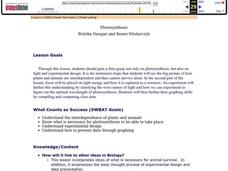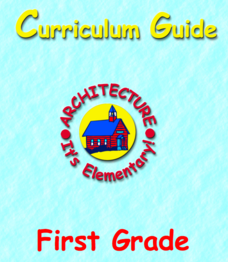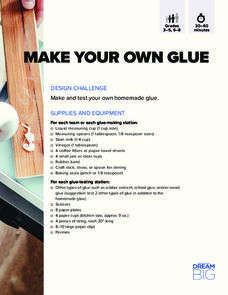Science Geek
Properties of Acids and Bases
It's all about that base! Teach the properties of acids and bases using the sixth slide show presentation in a series of seven. The lesson discusses acid and base properties and reactions. Pupils also see the effect on indicators when...
Cornell University
Classification
Explore the scientific method of classification. An interactive activity asks learners to create a classification system for a group of objects and develop a flow chart to communicate their systems. In addition, individuals use a...
Agency for Toxic Substances and Disease Registry
Don't Mess with Mercury (Lesson C)
The health effects of mercury exposure if the focus of the first of three activities about the properties of metals. Pairs research mercury to write, prepare, and share posters, articles, or PSAs with the class.
Teach Engineering
Preconditioning Balloons: Viscoelastic Biomedical Experiments
What does stretching a balloon have to do with equilibrium? Groups explore preconditioning by stretching a balloon to a point of equilibrium. They then measure the amount of force required to stretch the balloon to the same point several...
Curated OER
Commotion About Motion
Second graders are introduced to different types of motion. They make rolling spider toys and race them on different surfaces to invsetigate forces and motion. Pupils make glue "spider webs" for their spiders after testing different...
Curated OER
Food Additives
In this food additives worksheet, students will read information about the use of curing salt and ion nitrates to preserve food and the health problems that can occur from using these substances. Students will then answer 4 short answer...
Teach Engineering
Viscous Fluids
Elasticity and viscosity. Help your class understand the similarities and differences with an introduction to viscous fluids. After describing four types of fluid behaviors: shear thinning, shear thickening, Bringham plastic,...
Howard Hughes Medical Institute
Using DNA to Explore Lizard Phylogeny
In a fun and interactive two-day lesson, learners sort anole lizard pictures by appearance. Next, they watch a video about the anoles and re-sort based on the information in the video. In addition to physical characteristics, budding...
Curated OER
Photosynthesis
Students recognize the importance of plants as they perform an experiment involving photosynthesis. Students determine the optimum wavelength of light for photosynthesis by exposing plants to different colors of light, collecting data,...
Curated OER
Physical Properties Of Coal
Students examine and identify the observable properties of coal. After a lecture/demo, students perform a simple experiment. They observe samples of coal and record data in an organized manner.
Curated OER
Wildflower Beautification Project
Students, in cooperative groups, design and create a wildflower garden for the community. They write letters to property owners requesting use of their land and then write invitations to their parents and to local, state, and federal...
California Academy of Science
Plants: Hanging Tough
Learning about the rainforest can be more fun than you think. The class discusses vocabulary-in-context as they cut cardboard boxes, destined to become part of a rainforest model. Small groups of children color, cut, and construct...
Teach Engineering
Creepy Silly Putty
It might be silly to determine the creep rate of putty but groups will enjoy making different formulations of silly putty and playing with them to understand how the different mixtures behave. The second part of the activity has groups...
Curated OER
Energy Efficient Buildings
Seventh graders create plans for an energy efficient addition to the school. They work in small groups with each group having responsibility for examining one aspect of the problem. They create working diagrams and a model of their...
Curated OER
Minerals of the Earth
Students learn and practice identifying Earth's minerals and their properties. Working in small groups, they evaluate minerals. This is a well-described lesson, which students enjoy.
Curated OER
Speeding up the Fizz
Students investigate temperature and chemical reactions. They explore the effect of temperature and particle size has on the rate of a simple chemical reaction. In addition, they graph their results and answer assessment questions.
Curated OER
Somethin' Sweet
Students make their own candy. In this science lesson plan, students observe how molecules interact with each other in physical changes and observe how the addition of heat can cause molecules to interact and form new molecules in...
Curated OER
Information And Advice On Drugs
Students identify and analyze a variety of sources for information and statistics on drugs. They map out why its important to know the facts about drugs. In addition, they show examples of what happens when you use drugs of any kind.
Cornell University
Nano What?
The size of a nanoparticle is difficult for pupils to grasp. A hands-on experiment is designed to give your classes perspective. Learners analyze different sports drinks for the content of electrolytes as an introduction to nanoscale....
American Institute of Architects
Architecture: It's Elementary!—First Grade
Build an interest and appreciation for architecture in your young learners with this fun 10-lesson art unit. Engaging children in using their five senses, the class first observes the environment around them, paying...
Teach Engineering
Surface Tension Lab
What constitutes a good soap bubble? In the second installment of a nine-part series, scholars apply their understanding of surface tension to soap bubbles. They experiment to determine the best solutions to use for the...
DiscoverE
Make Your Own Glue
You won't regret being stuck with this activity. By mixing a variety of household items, pupils create their own glue. They test the tensile strength of their glue and compare it to that of other adhesives.
Curated OER
Matter
Students complete a unit of activities to learn about states of matter and how to measure matter. In this matter lesson plan, students complete 8 lessons to learn about matter, its states, and how to measure matter.
Curated OER
Density
Second graders watch a demonstration and complete an experiment to determine how an objects' density allows it to float or sink. They work in small groups to assimilate the characteristics of items that float as opposed to simply...






















